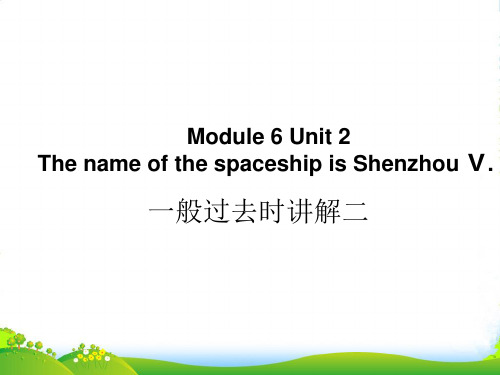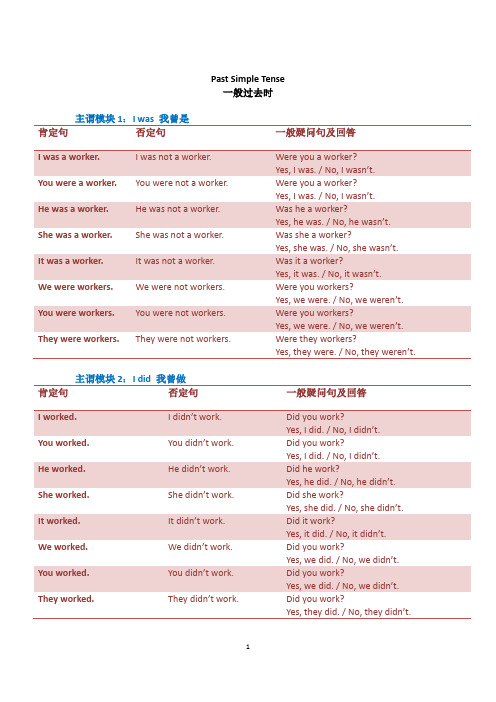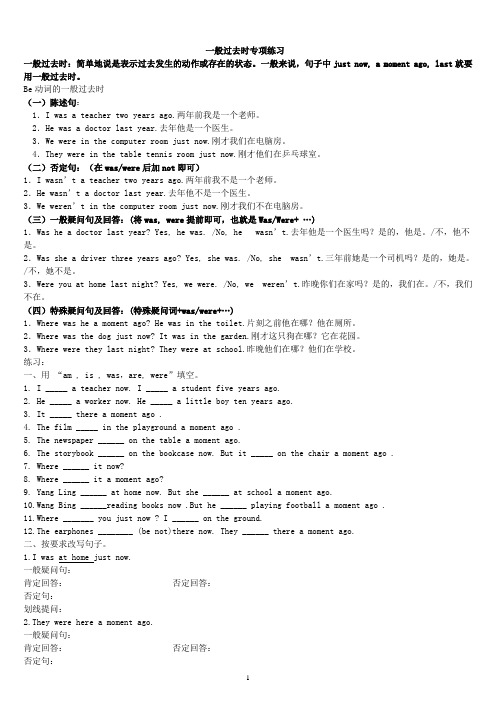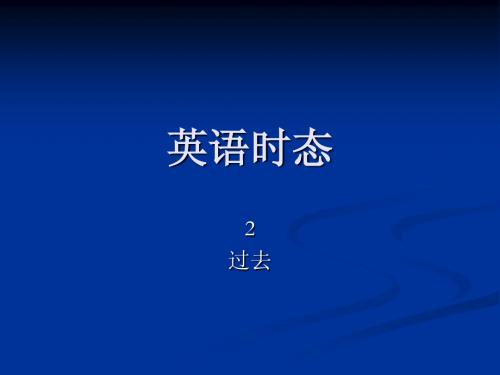一般过去时(2)
新外研版六年级英语下册Module 6 Unit 2 --一般过去时讲解二

一般疑问句: Did they have a good time in the park?
肯定/否定回答: Yes, they did. No, they didn’t.
2. Ann did her homework yesterday evening.
•不习惯读书进修的人,常会自满于现状,觉得再没有什么事情需要学习,于是他们不进则退。经验丰富的人读书用两只眼睛,一只眼睛看到纸面上的话,另 一眼睛看到纸的背面。2022年4月3日星期日2022/4/32022/4/32022/4/3 •书籍是屹立在时间的汪洋大海中的灯塔。2022年4月2022/4/32022/4/32022/4/34/3/2022 •正确的略读可使人用很少的时间接触大量的文献,并挑选出有意义的部分。2022/4/32022/4/3April 3, 2022 •书籍是屹立在时间的汪洋大海中的灯塔。
谢谢观赏
You made my day!
我们,还在路上……
Module 6 Unit 2 The name of the spaceship is Shenzhou Ⅴ.
一般过去时讲解二
past now
future
一般过去时 肯定句变否定句
be动词类 •过去存在的状态 的句子中在was, were的后面加上not。
肯定/否定回答: Yes, I did. No, I didn’t.
4. My brother was in the park just now.
• 一般疑问句: • Was your brother in the park just now?
肯定/否定回答: Yes, he was. No, he wasn’t.
英语专项 语法 时态 2 一般过去时 讲解+练习+答案 simple past

Past Simple Tense一般过去时主谓模块1:I was 我曾是肯定句否定句一般疑问句及回答Yes, I was. / No, I wasn’t.He was a worker. He was not a worker. Was he a worker?Yes, he was. / No, he was n’t. She was a worker. She was not a worker. Was she a worker?Yes, she was. / No, she was n’t.It was a worker. It was not a worker. Was it a worker?Yes, it was. / No, it was n’t.We were workers. We were not workers. Were you workers?Yes, we were. / No, we were n’t. You were workers. You were not workers. Were you workers?Yes, we were. / No, we were n’t. They were workers. They were not workers. Were they workers?Yes, they were. / No, they were n’t.主谓模块2:I did 我曾做肯定句否定句一般疑问句及回答Yes, I did. / No, I did n’t.He worked. He did n’t work.Did he work?Yes, he did. / No, he did n’t. She worked. She did n’t work. Did she work?Yes, she did. / No, she did n’t. It worked. It did n’t work. Did it work?Yes, it did. / No, it did n’t.We worked. We did n’t work. Did you work?Yes, we did. / No, we did n’t. You worked. You did n’t work.Did you work?Yes, we did. / No, we did n’t. They worked. They did n’t work.Did you work?Yes, they did. / No, they did n’t.标准句子结构●主谓模块1+X+时间模块I was a worker then. 那时我还是一个员工。
【英语】过去将来时一般过去时知识点总结(2)

【英语】过去将来时一般过去时知识点总结(2)一、过去将来时1.When we were boys we swimming every summer.A. goB. would goC. wentD. goes【答案】B【解析】【分析】句意:小时候,每到夏天我们都要去游泳。
When引导时间状语从句,从句用一般过去时,主句用过去将来时,would+动词原形,表示过去习惯性的动作。
故选B。
【点评】考查would+动词原形表习惯性动作。
2.—What did your son say in the letter?—He told me that he __________ the Great Wall the next day.A. will visitB. has visitedC. is going to visitD. would visit【答案】 D【解析】【分析】句意:你的儿子在信中说什么?他告诉我他第二天要去参观长城.结合语境可知从句描述的是站在过去角度看将来发生的动作,故用过去将来时态,故选D.【点评】英语中的时态主要是借助于时间状语与上下文语境来进行判断。
解答此类题型,首先要注意句子中的时间状语,如果没有则要通过分析上下文,结合语境来判断句子的时态。
英语疑问句中一般具有时态上的对应关系,注意结合这一特点进行区分。
3.Mr. Wu said he ______ us to the zoo the next week.A. would takeB. will takeC. takeD. takes【答案】 A【解析】【分析】句意:吴老师说他下周会带我们去动物园。
在这个句子中,said 后面跟的是一个宾语从句,从句中的时态是由主句决定的。
主句中said 用的是过去时,故宾语从句中也需用过去时态。
the next week 下周,是一个将来的时间。
故应该用过去将来时。
故选A。
【点评】考查动词时态。
A3-八年级上册英语-一般过去时(2)和阅读理解(1)

课程名称
学生姓名___________学科_________年级_____________
教师姓名___________平台_________上课时间_____________
1.通过对对be动词的一般过去时句子结构和实义动词的一般过去时句子结构进行类比,理解实义动词的一
般过去时句子结构
2.通过对学生的动觉刺激,促进学生对一般过去时的句子结构的有效记忆
3.通过动觉类比法,引导学生建构学科知识体系,激发解决相关问题的潜能
(25分钟)
回顾旧知识
注:最少保留两个任务
(通过老师引导,学生写出新知识)
注:可根据以下思路引导:1.相似与不同;2.易错点。
(15分钟)
考点:(学生写出本题的考点) ________________________________________________________
考点:(学生写出本题的考点)
____________________________
____________________________
至少2个例题
(15分钟)
练习题与例题知识点内容、难度、题型匹配。
至少2个习题
(5分钟)手写板,每个不少于3行
(20分钟)
注:
1.原则上,所有知识点均需用类比模板呈现,如遇到不易用类比关系讲解的知识,可用对比关系模板;
2.用类比关系讲解出新知识,新知识顺带的知识点可以直接呈现。
答案
记忆再现 1. AAABB 2.ACBDA
追踪演练例1 CACAC 例2 DCCB
自我提升DDABC ADB。
一般过去时专项一(2)

一般过去时专项练习一般过去时:简单地说是表示过去发生的动作或存在的状态。
一般来说,句子中just now, a moment ago, last就要用一般过去时。
Be动词的一般过去时(一)陈述句:1.I was a teacher two years ago.两年前我是一个老师。
2.He was a doctor last year.去年他是一个医生。
3.We were in the computer room just now.刚才我们在电脑房。
4.They were in the table tennis room just now.刚才他们在乒乓球室。
(二)否定句:(在was/were后加not即可)1.I wasn’t a teacher two years ago.两年前我不是一个老师。
2.He wasn’t a doctor last year.去年他不是一个医生。
3.We weren’t in the computer room just now.刚才我们不在电脑房。
(三)一般疑问句及回答:(将was, were提前即可,也就是Was/Were+ …)1.Was he a doctor last year? Yes, he was. /No, he wasn’t.去年他是一个医生吗?是的,他是。
/不,他不是。
2.Was she a driver three years ago? Yes, she was. /No, she wasn’t.三年前她是一个司机吗?是的,她是。
/不,她不是。
3.Were you at home last night? Yes, we were. /No, we weren’t.昨晚你们在家吗?是的,我们在。
/不,我们不在。
(四)特殊疑问句及回答:(特殊疑问词+was/were+…)1.Where was he a moment ago? He was in the toilet.片刻之前他在哪?他在厕所。
2.英语时态(2)过去

4.否定形式: was/were+not;在行为动词前加didn't,同时还原行 为动词。 5.一般疑问句: was或were放于句首;用助动词do的过去式did 提 问,同时还原行为动词。 6.例句: She often came to help us in those days. I didn't know you were so busy.
在含有时间状语从句的复合句中,延续时间较长的动作用 过去进行时,另一个动作用一般过去时。如果表示两个延 续动作在过去某一时刻同时进行,而不考虑动作的先后长 短,则主句和从句的谓语动词都用过去进行时。 My pen dropped on the ground when I was walking in the park. 我在公园散步的时候,我的钢笔掉到地上了。 When I entered the room, she was sitting at her desk.我进屋的 时候,她正坐在书桌前面。 The students were reading while the teacher was grading their homework.学生们在看书,而老师在批改他们的家庭作业。
2. 表示过去连续发生的动作时,要用过 去时
这种情况下,往往没有表示过去的时 间状语,而通过上下代来表示。 The boy opened his eyes for a moment, looked at the captain,and then died. 那男孩把眼睛张开了一会儿,看看船 长,然后就去世了。
(2)表示过去某段时间正在进行的动作。 Shirley was writing a book about China last year but I don't know whether she has finished it.舍 利去年在写一本有关中国的书,但我不知 道他是否完成。 They were building a dam last winter.去年冬天 他们在建大坝。 I was living in my teacher's house when I was in middle school.上中学时,我住在老师家里。
(完整)英语一般过去时语法知识归纳总结(2),推荐文档

一般过去时语法知识一般过去时表示过去某个时间发生的动作或状态;过去习惯性、经常性的动作、行为;主语在过去时间段所具备的能力和性格。
一般过去时句子最明显的现象就是常由表达过去时间的副词、副词短语或从句来界定。
“过去”的概念并不仅指如“yesterday, last week,……”等,实际上...“.非现在......“.与现在对立的过去........”.,亦即的以前..”.形成对立,就必...............“.现在...........“.过了说话时间的几分钟之前............”.,只要所要表达的时间与说话时的...”.,哪怕是须使用一般过去时来表达。
............例如:He was here only a few minutes ago. 仅仅几分钟前他还在这里。
I came home just now. 我刚回到家。
“this + 时间,today”等时间副词常用于修饰一般现在时,但是只要..........”.对立,..句子的本意是......“.与说话时的现在即使句子中有..必须使用一般过去时。
..........例如:......“.th..i.s. + .时间,....,也.....”.等.时间副词...todayI got up very early this morning. 今天早晨我起床很早。
He was late for school again today. 今天他又迟到了。
强化理解:1. 一般过去时表示在过去某个特定时刻或时期所发生的事情,也可以表示过去习惯性、经常性的动作。
一般过去时只说明过去的事情...........。
..............,.不强调动作对现在的影响I had a word with Julia this morning. 今天早晨,我跟朱丽亚说了几句话。
He smoked many cigarettes a day until he gave up. 他没有戒烟的那阵子,抽烟抽得可凶了。
(完整版)小学英语一般过去时习题及答案 (2)

用括号内所给词的适当形式填空1. We _________ (enjoy) ourselves at the party last night.2.Jack ____________ (study) for the English test last Sunday.3._______ you ______ (go) to the Great Wall last year?4.The old man _______(be)ill and went to see a doctor.5.We ________ (have) a party last night.6.We __________ (visit) the museum and went home.7.— How _______ (be) the students? — They were very friendly.8.He often _______ (eat) dinner at home. Today he ______ (eat) dinner at school.9.— ______ he _______ (have) lunch at nine? — No, he didn’t.10.They _________(buy) a piano yesterday.11.What __________ (make) him cry (哭) just now?st year the teacher ___________ (tell) us that the earth moves around the sun.练习二用所给动词的适当形式填空1.Tom and Mary ___________ (come) to China last month.2.Mike __________(not go) to bed until 12 o’clock last night.3.Mary __________ (read) English yesterday morning.4.There _________ (be) no one here a moment ago.5.I ___________ (call) Mike this morning.6.I listened but ___________ (hear) nothing.7.Tom ___________ (begin) to learn Chinese last year.st week we _________ (pick) many apples on the farm.9.My mother ________________ (not do) housework yesterday.10.She watches TV every evening. But she _______________ (not watch) TV last night.11.________ your father ________ ( go ) to work every day last year?12. When ______ you ____(get) to Beijing yesterday? We _____(get) to Beijing at 9:001. He came here last month. (改为否定句) He _______ _______ here last month.2.They played football this morning. (改为一般疑问句并作简略回答)—_____ they _____ football this morning? —Yes, they _______./No, they ______ .3.They went to Beijing last year. (就划线部分提问)_________ _________ they ________ last year.4.Tom watched TV last night. (改为一般疑问句) _______ Tom _______ TV last night?5.Mary does homework every day. (用last night 改写句子)Mary ________ ____________ _________ ________ .6. He’s cleaning his rooms. (划线提问)______ ______he _______?7. My family went to the beach last week. (划线提问)________ ________ ________ family _______ last week?按要求变换句型。
- 1、下载文档前请自行甄别文档内容的完整性,平台不提供额外的编辑、内容补充、找答案等附加服务。
- 2、"仅部分预览"的文档,不可在线预览部分如存在完整性等问题,可反馈申请退款(可完整预览的文档不适用该条件!)。
- 3、如文档侵犯您的权益,请联系客服反馈,我们会尽快为您处理(人工客服工作时间:9:00-18:30)。
EXERCISES 1 : NEGATIVE SENTENCES
I was a student. I wasn’t a student. She liked playing the piano. She didn’t like playing the piano. Tom did the homework in the evening. Tom didn’t do homework in the evening. They were my classmates. They weren’t my classmates. Mary bought this coat Mary didn’t buy this coat.
Bob and his parents didn’t go to the local museum yesterday.
Bob and his parents went to the local museum yesterday.
Did Bob and his parents go to the local museum yesterday? —No, they didn’t.
2. Who 做疑问词且当主语时,其语序是陈述语句。 既“疑问词+谓语+其他成分”。
e.g. Who told you this news? (区分: who did you go with?)
请用who, what, when, where对下列句中的各成分提问。
Tom played basketball in school last weekend who what
―YES/NO‖QUESTIONS IN SIMPLE PAST
TENSE
Be 动词:1)was/were 提前 2)如果主语是人称代词I/we, 则将其改成you,并把was 改成were.
Eg. ①I was at home yesterday. → Were you at home yesterday? ②They were happy last weekend. → Were they happy last weekend? 实意动词:1)最前面加did; 2)动词改成原形; 3)若主语是I/we, 改成you. Eg. ①He heard a sound. → Did he hear a sound? ②We went to the park last week. → Did you go to the park last week?
SIMPLE PAST TENSE Ⅱ
LEARNING OBJECTIVES
At the end of the class, you’ll be able to: have a better understanding of verbs in simple past form. make negative sentences in simple past tense. make ―YES/NO‖questions in simple past tense. make special questions in simple past tense.
Li Ping didn’t practice English with her
friend last weekend. Li Ping practiced English with her friend last weekend.
Did Li Ping practice English with her friend last weekend? —No, she didn’t.
ACTIVITY
Work in pairs,
1.
2.
Change the following sentences into statements or negatives. Change them into ―YES/NO‖ questions and give the answers according to the first sentence.
EXERCISES 2: ―YES/NO‖QUESTIONS
1. I was a student. Were you a student? 2. She liked playing the piano. Did she like playing the piano? 3. Tom did the homework in the evening. Did Tom do the homework in the evening? 4. They were my classmates. Were they your classmates? 5. Mary bought this coat. Did Mary buy this coat?
1. 2. 3. 4. 5.
Iwas am a student. She liked likes playing the piano. Tom does did the homework in the evening. They are my classmates. Marywere buys this coat. bought
Verbs ending in –e
+d
bake-baked, dance-danced, hope-hoped
study-studied, try-tried, carry-carried mop-mopped, drop-dropped
Verbs ending in a consonant +y
特殊疑问词 what(什么), when(什么时候), where(哪里), who(谁), How(怎样)
TWO KINDS OF SPECIAL QUESTIONS
1.What When ,where, how 作疑问词时, 其语序是:疑问词+一般疑问句。
e.g. what did you do last weekend? When did you go there? Where did they go ? How was your holiday?
I didn’t send a postcard to my friend in Tianjin a week ago.
Did you send a postcard to your friend in Tianjin a week ago? —Yes, I did.
SPECIAL QUESTIONS 以特殊疑问词开头,对句中某一成分提问的句子叫特 殊疑问句。
NEGATIVE SENTENCES IN SIMPLE PAST TENSE
Be 动词:后加 not was not → wasn’t ; were not → weren’t Eg. ①I was at home yesterday. → I was not/ wasn’t at home yesterday. ②They were happy last weekend. → They were not/ weren’t happy last weekend. 实意动词:1)动词前加did not; 2)动词变成原形。 did not → didn’t Eg. ①He heard a sound. → He did not/ didn’t hear a sound.
Rosalie and Nina chatted online in the winter holiday.
Rosalie and Nina didn’t chat online in the winter holiday.
Did Rosalie and Nina chat online in the winter holiday? —Yes, they did.
HOW TO ANSWER ―YES/NO‖QUESTIONS
Be 动词: 肯定回答:Subject +was/were. 否定回答: Subject +was/were not. Were you at home yesterday? → Yes, I was./ No, I was not. Were they happy last weekend? → Yes, they were./ No, they were not. 实意动词: 肯定回答:Subject +did. 否定回答:Subject +did not. Did he hear a sound? → Yes, he did./ No, he did not. Did you go to the park last week? → Yes, we did./No, we did not.
R2: WRITE DOWN VERBS IN SIMPLE PAST
TENSE
be —_____ Was/were did do —_____ go —_____ went came come—_____ played play —_____ studied study—_____ wanted want—_____ hope—_____ hoped
Tom had great fun last summer holiday.
Tom didn’t have great fun last summer holiday.
Did Tom have great fun last summer holiday? —Yes, he did.
I sent a postcard to my friend in Tianjin a week ago.
HOMEWORK
Finish the exercises in the textbook. Write your experience(经历) last weekend.
